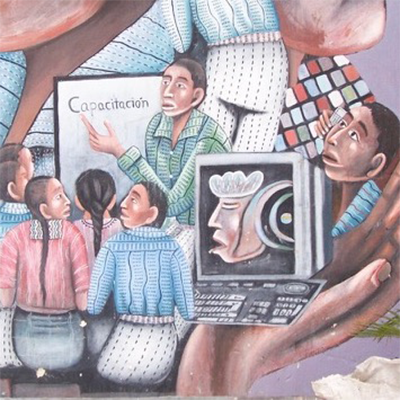Description
 This course introduces you to theoretical frameworks and research that consider the impact of culture on communications and learning in virtual learning environments. The course investigates culture in broader terms and asks how culture affects the core values that determine our perspectives on teaching and learning. You will reflect on your own culture to gain deeper insights into your assumptions and beliefs. You will explore many layers of diversity in your own personal and professional environments. Each module focuses on appreciating and actively seeking to understand diverse cultural perspectives in order to implement instructional practices that transcend cultural boundaries. We will especially seek to engage critically and creatively with questions that address digital colonialism, cultural intelligence, and social change.
This course introduces you to theoretical frameworks and research that consider the impact of culture on communications and learning in virtual learning environments. The course investigates culture in broader terms and asks how culture affects the core values that determine our perspectives on teaching and learning. You will reflect on your own culture to gain deeper insights into your assumptions and beliefs. You will explore many layers of diversity in your own personal and professional environments. Each module focuses on appreciating and actively seeking to understand diverse cultural perspectives in order to implement instructional practices that transcend cultural boundaries. We will especially seek to engage critically and creatively with questions that address digital colonialism, cultural intelligence, and social change.
Learning Objectives
In this course, you will:
- Acquire knowledge about and be able to critically study and reflect upon different theories and methods within the research field of intercultural communication.
- Become familiar with selected research literature investigating the relationships between culture, communication, and Internet technologies.
- Learn to observe, analyze, and interpret intercultural communication in a variety of face-to-face and virtual educational contexts, including your own.
- Critically examine the ways in which cultural assumptions and communication patterns may influence design and implementation of online learning.
- Gain insight into your own intercultural competence and be able to reflect upon your own intercultural communication patterns and attitudes.
- Gain insight that promotes the development of cultural intelligence.
Activities
In this course, there are multiple avenues, public and private, for you to engage with classmates and reflect on the materials and ideas introduced:
- By contributing to Unit discussion forums.
- By participating in two synchronous online seminars.
- By adding feedback comments to your classmates’ Hands-on Assignments.
- By adding private reflective entries to your Logbook.
Readings & Resources
All readings and resource materials for this course will be provided online, either through the course website or with links to materials that are freely available on the Internet or in the UBC Library.
However, the following two edited collections are highly recommended as resources and for your additional reading and may offer additional resource materials for some course assignments:
- Cheong, P. H., Martin, J. N., & Macfadyen, L. P. (Eds.). (2012). New media and intercultural communication: Identity, community and politics. Peter Lang.
- Goodfellow, R., & Lamy, M-N. (Eds.). (2009). Learning cultures in online education. Continuum. [Available as an eBook from the UBC Library]
Examples of other readings
- Fuchs, C. (2014). Social media – a critical introduction. Sage Publications.
- Parrish, P., & Linder-VanBerschot, J. A. (2010). Cultural dimensions of learning: Addressing the challenges of multicultural instruction. International Review of Research in Open and Distance Learning, 11(2), 1-19.
- Speece, M. (2012). Learning style, culture and delivery mode in online distance education. US-China Education Review, A1, 1-12.
Assignments & Assessment
- Learning portfolio (15%)
We trust and expect that you will take the time to engage in discussion- and reflection-based activities as you move through the materials in this course. Different venues offer you opportunities for different kinds of engagement with and reflection on course ideas, and we encourage you to make use of them all and also to consider whether the public or private format is more comfortable for you personally.
- Hands-on assignments (5) (70%)
These applied tasks will ask you to analyze and reflect upon authentic situations relating to cultural assumptions, online cultures, and culture in virtual learning environments. You are expected to link your reflections and your text to the arguments presented in the course literature.
- Online seminar participation (2) (15%)
The course makes use of a browser-based videoconferencing platform to convene small-group online seminars in which you will informally present and engage with your peers in critical discussion of selected materials from the field. One of the seminars will be dedicated to recent articles that focus on aspects of relevance to issues highlighted in this course.
Minor course topic, activity, reading/resource, and assignment details may change from year to year.